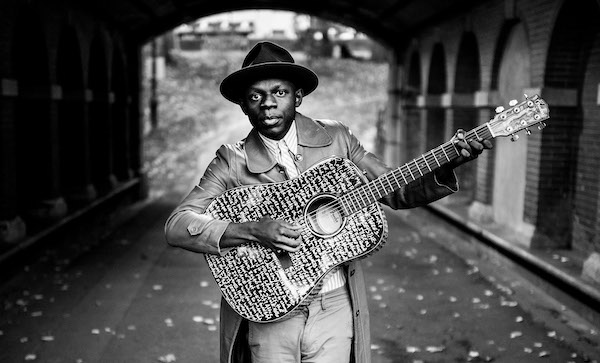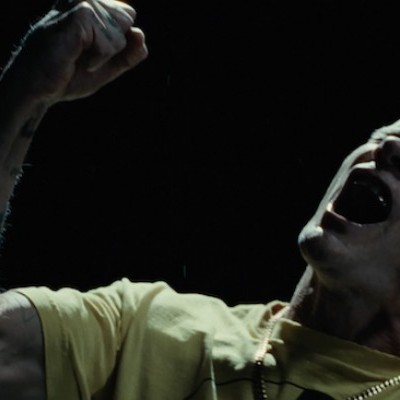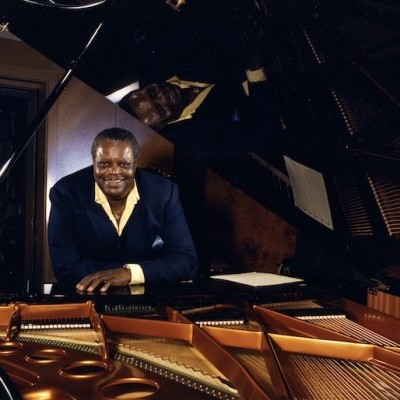Dec 9, 2025 12:28 PM
In Memoriam: Gordon Goodwin, 1954–2025
Gordon Goodwin, an award-winning saxophonist, pianist, bandleader, composer and arranger, died Dec. 8 in Los Angeles.…

J.S. Ondara says his family and the people he grew up around in Nairobi, Kenya, thought he was a bit eccentric. The singer/songwriter’s debut, Tales Of America, is out now.
(Photo: Josh Cheuse)J.S. Ondara speaks in a quiet, eloquent manner, choosing his words carefully—the tone befitting a songwriter.
He fell in love at an early age with the music of Bob Dylan, an emotion so deep that he entered a Green Card lottery and six years ago moved to Minnesota, the state where Dylan grew up. Kenya-born Ondara then set about teaching himself guitar.
The 26-year-old’s debut LP, Tales Of America, contains sweet and austere musings on love, loss and the elusory American dream, set within simple melodies, all driven by Ondara’s velvety voice. The album has garnered him critical acclaim, as well as a nomination for “Best Emerging Act” in the 2019 Americana Music Awards.
Ondara, who has North American tour dates booked through the beginning of November, recently chatted about inspiration, the craft of storytelling and his journey from Nairobi to Minneapolis.
The following has been edited for length and clarity.
You credit Dylan with having enormous influence on your artistic vision. What was it about his music that struck you so deeply?
I had never heard music that was that raw. I had just heard rock and loud guitars. I heard it and I said, “What?!” I was a bit baffled—the novelty of it, and I took a liking to it. Another part of it, I was trying to find myself as a teenager, as a kid, being in a sort of rebellious phase. So, I think the timing of it had a lot to do with it as well. It’s just that thing that I found as a kid that I felt very attached to and that stuck with me.
Then you started writing songs in a bluesy folk vein—and without a guitar?
That’s right ... calm and poetic stories with simple melodies. I was good at writing poems, it was something that I always did. When I heard Dylan’s music, I thought, I can take the poems I write and put them in some kind of melody. I could have some kind of career as a folk musician: I think I know what I want to do with my life! And also, at this stage in my life, I didn’t really know what to do to move forward, and when I picked up the guitar, after moving to the U.S., I would just look at the poems, and then I would add the melody, and they turned into songs.
What do you appreciate about the musical language of folk and Americana?
What I’ve found, it fits the style of storytelling and poetry that I’m drawn to; I don’t know if there is a better medium for storytelling than folk music. I’m especially a storyteller and a poet, so finding a musical companion to that just felt natural, it was a natural transition, the perfect relationship.
Since coming to the U.S., what kinds of experiences are you communicating in your music?
Definitely a lot of the record is a reflection on the kind of times we’re having in the country. I live it as an observer, making observations as an outsider—-like in “Days Of Insanity”—and put them in song. Art in its best form is usually some sort of mirror of the society, some way for us to reflect ourselves. As artists, we submit observations and we put them across as art, and then we can look at the observations and see ourselves and perhaps make changes that are necessary.
I was just trying to observe the times and put that in some sort of melody.
And how does your family feel about your music and life in the U.S.?
My family is still quite puzzled about what has become of my life. They really don’t know what to make of it; they don’t know much about the kind of music I make. I always liked words growing up and I liked songs and I was always pretty strange to everyone around me. My life now is just sort of an extrapolation of how strange I was as a kid. And they’re probably like, “Oh yeah, he’s there doing something; probably being weird.”
What about Minnesota, how’s life there—are you feeling at home?
I am now. It took a bit. I think I settled into it—Minnesota, and the people of Minnesota, are very kind and inviting.
With music, Minnesota and Minneapolis at large ended up being a perfect incubator for my career. When I moved here, it was just me. I picked up the guitar, I learned at advanced speed. I figured out what I wanted to say, how I wanted the music to be, how I wanted to be portrayed. And in an incorruptible way. The integrity that I have, I would like to keep for the entirety of my career. And that is something that began here, and I’m very grateful for that.
And finally, your amazing fashion sense—it’s very striking. How did that come about?
Yeah, I’ve always been a bit eccentric, since I was a kid. I would wear and change bow ties. I would find just the most bizarre thing I could find and wear that. But my view on fashion is not too different from how I view music now: I try to take old ideas of fashion and integrate them in new ways that can exist in the current time. DB

Goodwin was one of the most acclaimed, successful and influential jazz musicians of his generation.
Dec 9, 2025 12:28 PM
Gordon Goodwin, an award-winning saxophonist, pianist, bandleader, composer and arranger, died Dec. 8 in Los Angeles.…

Belá Fleck during an interview with Fredrika Whitfield on CNN.
Jan 13, 2026 2:09 PM
The fallout from the renaming of the John F. Kennedy Center for the Performing Arts to include President Donald…

Flea has returned to his first instrument — the trumpet — and assembled a dream band of jazz musicians to record a new album.
Dec 2, 2025 2:01 AM
After a nearly five-decade career as one of his generation’s defining rock bassists, Flea has returned to his first…

Dec 11, 2025 11:00 AM
DownBeat presents a complete list of the 4-, 4½- and 5-star albums from 2025 in one convenient package. It’s a great…

“It’s a pleasure and an honor to interpret the music of Oscar Peterson in his native city,” said Jim Doxas in regard to celebrating the Canadian legend. “He traveled the world, but never forgot Montreal.”
Nov 18, 2025 12:16 PM
In the pantheon of jazz luminaries, few shine as brightly, or swing as hard, as Oscar Peterson. A century ago, a…